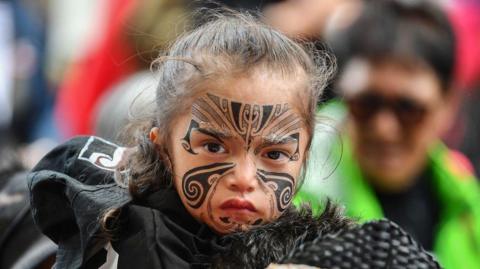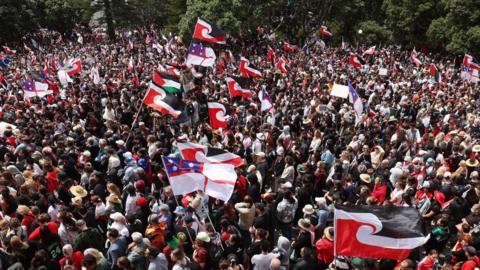Other New Zealanders felt the march has gone too far.
“They [Māori] seem to want more and more and more,” said Barbara Lecomte, who lives in the coastal suburbs north of Wellington. “There’s a whole cosmopolitan mix of different nationalities now. We are all New Zealanders. I think we should work together and have equal rights.”
Equality, though, is still a way off, according to Debbie Ngarewa-Packer, co-leader of Te Pāti Māori (Maori Party).
“We can’t live equally if we have one people who are the indigenous people living ‘less than’,” she argued. What the coalition government is doing is “an absolute attempt to divide an otherwise progressive country and it’s really embarrassing”.
New Zealand's parliament was brought to a temporary halt last week by MPs performing a haka, or traditional dance, in opposition to the bill. Footage of the incident went viral.
“To see it in parliament, in the highest house in Aotearoa, there’s been a real state of surprise and I think disappointment and sadness that in 2024 when we see politics and the Trump extremes, this is what the Māori are having to endure,” said Debbie Ngarewa-Packer. “It’s humiliating for the government because we [New Zealand] are normally seen as punching above our weight in all of the great things in life.”
Protest organisers on Monday taught participants the words and moves of the rally’s haka, with the audience enthusiastically repeating the lyrics written on a large white sheet.
“This isn’t just any normal hīkoi – this is the hīkoi of everybody,” said grandmother Rose Raharuhi Spicer, explaining that they’ve called on non-Māori, Pacific Islanders and the wider population in New Zealand to support them.
This was the fourth hīkoi Rose had been on. She comes from New Zealand’s northernmost settlement, Te Hāpua, directly above Auckland. It’s the same village that the most famous hīkoi started from, back in 1975, protesting over land rights.
This time, she brought her children and grandchildren.
“This is our grandchildren’s legacy,” she said. “It’s not just one person or one party – and to alter [it] is wrong.”


